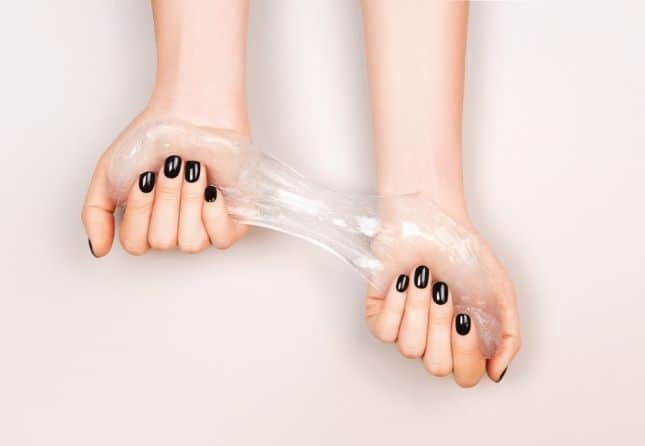Home > Female Body > Menstrual cycle > What does iodine have to do with your periods?


Have you heard of iodine? Did you know how having low iodine levels can affect your periods? Today we will talk about iodine and why it is important for our bodies.
Iodine is a mineral that our bodies need to function properly. It is important for our thyroid gland to make thyroid hormones.
Not having enough iodine means that our bodies can’t make enough thyroid hormone. This can lead to hypothyroidism (the medical term for low levels of thyroid hormone). This can cause changes with your periods. The most common disruptions in the menstrual cycle caused by iodine deficiency are heavy periods and irregular periods.
Unlike most important vitamins and minerals, which we can easily get from our food, iodine is not as readily found in things we eat.
There are some parts of the world where this is a bit harder because there is not much iodine in the soil (and therefore not much iodine in the food that is grown there). These places include South and Southeast Asia, many European countries and New Zealand.
Pregnant women are also at risk of low iodine, as are people who don’t eat iodised salt or those who are strictly vegan or vegetarian. If you don’t eat animal products (including fish) then it might be a good idea to take iodine supplements. If you think you might need this then talk to your healthcare professional.
The Vegan Society also has useful information about iodine for people who don’t eat animal products.
The easiest way to increase your iodine intake is to make sure you are using iodized salt. This way, every time you add salt to a meal you are also adding iodine.
Seafood and food products such as seaweed are usually the best sources of diet-based iodine. The iodine content of seaweed can depend on where the seaweed has come from. It pays to check the packet, but Japan is a source of seaweed that has good iodine levels.
Other food sources of iodine include fish, shrimp, egg and tuna. If you don’t eat seafood, yogurt is a pretty good source of iodine.
Iodine is especially important for pregnancy and breastfeeding. Pregnant or breastfeeding women need more iodine than other people and are more likely to be deficient. Iodine deficiency can also have important consequences for you or for your baby.
In places where iodine deficiency is common, iodine supplementation is recommended throughout pregnancy and while you are breastfeeding. Talk to your doctor or midwife if you are not sure if this applies to you.
Yes.
Just like most other things in our bodies, there needs to be a balance of how much iodine we have. Too much can also be harmful.
If you are taking iodine supplements make sure you are sticking with the recommended dose. Taking 0.5mg or less of iodine supplements is not likely to cause problems.
Most of us are able to get plenty of iodine just by eating a balanced diet.
If you have heavy or irregular periods or are worried that your thyroid might not be functioning normally then talk to your doctor to see if you need to change anything.
Disclaimer: This website does not provide medical advice. The information, including but not limited to, text, graphics, images and other material contained on this website are for informational purposes only. No material on this site is intended to be a substitute for professional medical advice, diagnosis, or treatment. Always seek the advice of your physician or other qualified healthcare provider with any questions you may have regarding a medical condition or treatment and before undertaking a new health care regimen, and never disregard professional medical advice or delay in seeking it because of something you have read on this website.

-


Dr Singh is the Medical Director of the Indiana Sleep Center. His research and clinical practice focuses on the myriad of sleep.

What vaginal discharge colors mean for your health Understanding vaginal discharge colors and meaning is essential for every woman at every stage of life. While some colored discharge may indicate infections, others are normal. White and clear The first discharge

Understanding perimenopause and menopause When talking about perimenopause versus menopause, it’s easy to confuse these two stages. Perimenopause is the transitional period when you move away from your peak fertility and your ovaries gradually stop releasing eggs. In turn, menstruation

Understanding perimenopause and its symptoms When it comes to aging, many women know about menopause but are surprised to learn about the transitional stage leading up to it, called perimenopause. There are three stages of perimenopause: early, late, and menopause,
| Cookie | Duration | Description |
|---|---|---|
| cookielawinfo-checkbox-analytics | 11 months | This cookie is set by GDPR Cookie Consent plugin. The cookie is used to store the user consent for the cookies in the category "Analytics". |
| cookielawinfo-checkbox-functional | 11 months | The cookie is set by GDPR cookie consent to record the user consent for the cookies in the category "Functional". |
| cookielawinfo-checkbox-necessary | 11 months | This cookie is set by GDPR Cookie Consent plugin. The cookies is used to store the user consent for the cookies in the category "Necessary". |
| cookielawinfo-checkbox-others | 11 months | This cookie is set by GDPR Cookie Consent plugin. The cookie is used to store the user consent for the cookies in the category "Other. |
| cookielawinfo-checkbox-performance | 11 months | This cookie is set by GDPR Cookie Consent plugin. The cookie is used to store the user consent for the cookies in the category "Performance". |
| viewed_cookie_policy | 11 months | The cookie is set by the GDPR Cookie Consent plugin and is used to store whether or not user has consented to the use of cookies. It does not store any personal data. |
